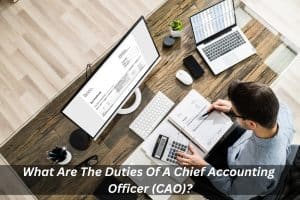What Are The Duties and Qualities Of A Chief Accounting Officer (CAO)?
In organizations, accounting officers are responsible for managing financial activities, including planning and oversight. But what are the specific duties of a Chief Accounting Officer (CAO)?
Chief Accounting Officers (CAOs) play an essential role in any business or organization. They are responsible for overseeing all the organization’s financial activities and making sure that the books and the accounts balance out correctly.

The CAO is in charge of developing strategies and procedures to keep up with complex laws regarding taxes, regulatory compliance, etc. In addition, they also have to manage financial systems and supervise accounting staff to make sure everything is running as efficiently as possible. In this article, we’ll examine in more detail the responsibilities of a CAO, such as preparing and presenting financial statements, calculating taxes and leading internal audits.
The CAO is responsible for the day-to-day operations of the accounting department. This includes overseeing accounts receivable, accounts payable, payroll and general ledger activities. They must also ensure that all financial transactions are recorded accurately and in accordance with International Financial Reporting Standards (IFRS). It is imperative for the Chief Administrative Officer to understand the firm’s financial regulations, procedures and laws.
The Chief Accounting Officer ensures that the organization’s budget is aligned with its aims and objectives. They must also be able to identify any potential risks or areas of improvement.
Also, they are accountable for leading internal audits and making sure that all financial records are accurate and up-to-date. They should also be able to provide advice on how to improve the company’s financial processes and procedures.
To achieve success as a Chief Accounting Officer, a degree in accounting and extensive experience are essential. You should also have strong leadership skills and be able to work well with other departments within the organization. Want to know how different a Financial Controller is from a CAO? Please check out this blog.
Chief Accounting Officer Duties and Qualities
Tech-savvy and knowledgeable about data
The CAO must also be tech-savvy and knowledgeable about data. They should have a good understanding of the latest accounting software and technology like Xero, as well as the ability to analyze large amounts of data quickly and accurately. This will help them identify any potential risks or areas of improvement in the company’s financial processes. The CAO should also be able to use data to make informed decisions and provide sound advice to the chief financial officer (CFO) and other executive levels.
Leadership skills
The CAO must also have strong leadership skills in order to be successful. They should be able to motivate and inspire their team, as well as provide guidance and direction. They should also be able to delegate tasks effectively and ensure that all staff members are working towards the same goals. Finally, they should be able to think strategically and come up with innovative solutions to any financial issues that may arise.
The ability to communicate effectively
The CAO must also have excellent communication skills in order to be successful. They should be able to effectively communicate with other departments within the organization, as well as the financial controller, and external stakeholders such as investors and creditors. They should also be able to clearly explain complex financial concepts in a way that is easy for others to understand. The CAO should also be able to present financial statements and reports in an organized and professional manner.
Having a strong desire to learn or know more
The CAO must also have a strong desire to learn and know more. They should be constantly looking for ways to improve their knowledge and skills, such as attending seminars or taking courses related to accounting and finance. They should also be open to new ideas and willing to take risks in order to find innovative solutions. The Chief Administrative Officer should be aware of industry trends and able to adjust rapidly to market shifts.
What kinds of decisions does a Chief Accounting Officer (CAO) make?
The CAO is responsible for making a wide range of decisions that affect the company’s financial performance. These decisions include setting and monitoring budgets, developing strategies to reduce costs, and ensuring compliance with International Financial Reporting Standards (IFRS). The CAO must also make decisions related to investments, mergers and acquisitions, and other financial transactions. They must be able to recognize issues with the organization’s financial methods and create plans to tackle them.
In conclusion, the duties of a Chief Accounting Officer (CAO) are varied and complex. They are responsible for overseeing all financial activities, preparing and presenting financial statements, managing the budget and leading internal audits. They must also have a degree in accounting and several years of experience in the field. If you need professional help with accounting services, you may contact these experts for services from reliable virtual CFOs and business accountants.
